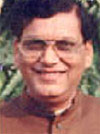|
| |
| Speaker |
| |
| Dr
Bindeshwar Pathak
Founder,
Sulabh International, New Delhi |
 |
Born in 1943 in
a family of the highest of the high in caste hierarchy of India the
susceptible and impressionable mind of young Bindeshwar Pathak was
influenced by the attitude of his maternal grand father, a freedom
fighter, and the way the old man had freed himself from the shackles
and stranglehold of social rigidities. An incident here and an episode
there moulded, rather encouraged the questioning and rebellious mind
of young Bindeshwar.
India was on the threshold of freedom and the spirit of young Pathak
was fluttering to gain new heights to explore new horizons. Education
began and petty jobs were taken up. Boredom and dissatisfaction played
their part. Later he was to complete his thesis and attain the distinction
of securing a D.Litt. In the intervening period the rising star came
for notice when he founded in 1970 the Sulabh International Social
Service Organisation and for achieving success in the field of low-cost
sanitation, social transformation of society, prevention of environmental
pollution and development of non-conventional sources of energy. Merely
enumerating academic degrees acquired by him, or recounting awards
and honours conferred upon him will not be doing justice to writing
of a bio-data or penning a biographical sketch of Dr. Pathak to arrive
at a correct and a balanced appreciation and assessment of work that
Dr. Pathak has done. In a way, it will not be wrong to say that his
achievements in the field of sanitation, benefiting millions, is his
real bio-data.
And therefore one has to go back to 1968-69 when he started weaving
the warp and weft of sanitation technologies working with the Gandhi
Centenary Committee, where he was inspired to work for liberation
of scavengers – those engaged in manual cleaning of excreta
of others. From 1969 to 1974 he spent time munching ideas, conducting
experiments and carrying research to come up with twin-pit pour-flush
toilet system. This technology developed and modified by him has helped
wean away, over 60,000 scavengers from their demeaning task by converting
bucket privies into Sulabh toilets and constructing new toilets that
figure over a million. Based on his concept of "pay and use toilets",
Sulabh has constructed nearly 6,000 public toilets in different states
of India. Together the two viz. individual household and community
toilets are used by ten million people every day.
Production of biogas from human excreta of public toilet is his unique
achievement. So far 117 biogas plants have been constructed; biogas
from which is being used for cooking, lighting and electricity generation.
Another remarkable breakthrough in technology has been the development
of Sulabh Effluent Treatment (SET) system which renders the sewage
colourless, odourless and pathogen free fit for agricultural and horticultural
purposes. The sullage of biogas plant is soil nutrient rich. An achievement
worth mentioning has been the development of Sulabh Thermophilic Aerobic
Composter (STAC) which composts biodegradable wastes within a period
of 8 to 10 days as against, through the present day technology in
30 to 40 days. On-site waste disposal and waste water treatment technologies
have led to beneficial effects on environment and prevention of insanitation
related diseases. His effort has created almost permanent jobs for
over 50,000 social workers with Sulabh.
These achievements of his have resulted in United Nations Centre for
Human Settlement recognising Sulabh's cost-effective and appropriate
sanitation system as a "Global Urban Best Practice" at the
Habitat-II Conference held 1996; and UNCHS (Habitat) conferring the
2000 Dubai International Award on Sulabh. Largely due to his efforts
the Economic and Social Council of United Nations has granted Special
Consultative Status to Sulabh.
He is an Honorary Fellow of the Institute of Public Health Engineers
(India) and a Life Member of Indian Science Congress Association.
He is a member of different councils/committees of the Government
of India. Amongst the prominent awards conferred upon him and recognitions
accorded to him include International St. Francis Prize for the Environment,
Canticle of Creatures, in 1992, Assisi, Italy; Padma Bhushan by the
President of India, in 1991. A recipient of "Global 500 Roll
of Honour" Award of United Nations Environment Programme (UNEP)
for his outstanding environmental achievements in October, 2003 Dr.
Pathak was given "Habitat Scroll of Honour" Award by UN-Habitat
for developing and instituting over one million twin-pit pour-flush
toilets in India. He has been honoured with being appointed Special
Sanitation Advisor to the WSSCC Secretariat. Technologies developed
by him have received recognition and appreciation by various agencies
like WHO, WSSCC, UNICEF, UNDP, World Bank, UNCHS, HABITAT etc. The
significant contribution made by Sulabh which stands identified with
Dr. Pathak in the field of sanitation finds mention in UNDP Report
- 2003.
He has written a number of books on sanitation and related social
problems. His seminal achievements have been appreciated and acknowledged
by national and international press and audio-visual media.
Summing up his achievements and his bio-data we can say that he has
journeyed from a period of faith to age of reason bringing enlightenment
in the field of sanitation for millions. He has to his credit a distinguished
past. A glorious future surely awaits him. |
|



